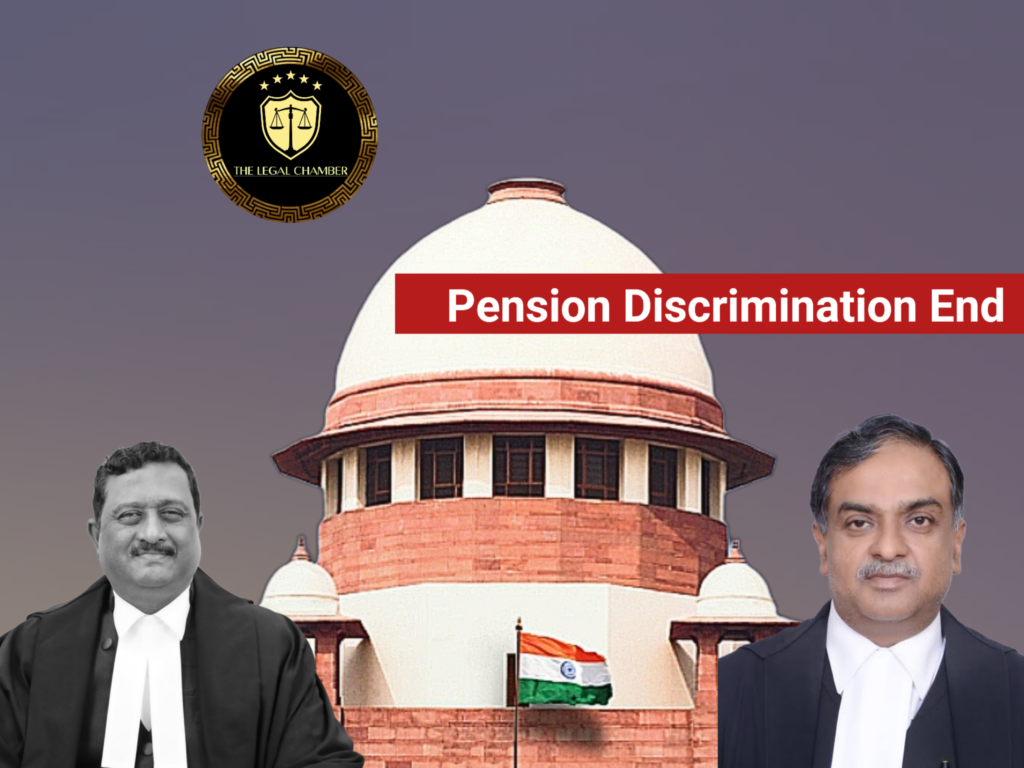
The Supreme Court ruled that employees absorbed by MPSEB from cooperative societies are entitled to pension under MPSEB rules, but only from their absorption date (15.03.2002), not their prior society service. Invoking Article 142, it mandated uniform treatment for all absorbed employees, upholding functional integration principles from Panchraj Tiwari (2014) while interpreting “qualifying service” under MP Madhya Pradesh Civil Services (Pension) Rules, 1976. The Court rejected retrospective pension claims for pre-absorption periods as society service wasn’t state-regulated.
Facts Of The Case:
The case concerns employees of electricity distribution cooperative societies in Madhya Pradesh that were merged with the Madhya Pradesh State Electricity Board (MPSEB) in 2002 due to financial crises. The 1995 merger policy and subsequent 2004 absorption terms initially stipulated that pension/gratuity would be governed by the societies’ rules, not MPSEB’s scheme. Disputes arose when the Bijli Karamchari Sangh (BKS) and other employees demanded parity with regular MPSEB employees, including pension benefits counting their entire service tenure – both pre-and post-absorption. The litigation began in 2005 with BKS’s writ petition, leading to a 2015 High Court order directing MPSEB to extend pension benefits, which was upheld by the Supreme Court in 2018. However, a 2019 Full Bench of the High Court reversed this, ruling that absorbed employees were only entitled to society-governed pensions.
The Supreme Court consolidated multiple appeals, including contempt proceedings, where some employees had already received partial pensions post-absorption. The core issues were whether absorbed employees were entitled to MPSEB pension rules, and if their society service period should count toward qualifying service. The Court noted conflicting High Court judgments and implemented settlements in some cases, creating inequitable outcomes among similarly placed employees
Procedural History:
The case originated in 2005 when Bijli Karamchari Sangh filed Writ Petition No.1151/2005 before the Madhya Pradesh High Court challenging the absorption terms. A 2015 Single Judge order directed MPSEB to extend pension benefits, which was upheld by a Division Bench in Writ Appeal No.334/2015 and later by the Supreme Court in 2018. However, conflicting 2019 orders emerged when another Division Bench in Writ Appeal No.897/2019 referred the matter to a Full Bench, which overturned the earlier judgments and denied pension parity. This created a split where some employees (BKS members) received post-absorption pensions while others were denied entirely.
The Supreme Court consolidated 15+ connected appeals, including contempt proceedings (SLP(C) Nos.23286/2019 & 3805/2021), where implementation issues arose. The apex court’s 2025 judgment resolved the conflict by harmonizing the contradictory High Court rulings through its Article 142 powers, establishing a uniform standard for all absorbed employees while delineating the temporal scope of pension eligibility.
Read Also: Supreme Court Sets New Benchmark for Accident Claims
Court Observation:
The Supreme Court made several critical observations in its judgment. First, it emphasized the principle of “complete functional integration” established in Panchraj Tiwari (2014), ruling that absorbed employees must be treated on par with MPSEB staff, as their original service identity ceased post-merger. The Court rejected the Full Bench’s contrary view, noting it created an “unjust dichotomy” between employees who had secured pensions through earlier litigation and those denied under the 2019 ruling.
On qualifying service, the Court interpreted Rule 12(2) of the MP Civil Services (Pension) Rules strictly, holding that pre-absorption society service could not be counted since it wasn’t state-regulated. However, it invoked Article 142 to ensure uniform relief, mandating pensions for all absorbed employees from their merger date (15.03.2002). The judgment underscored that discrimination in pension eligibility based on litigation timing would violate constitutional equality, observing: “One set with pension and another without in the same organization is impermissible.” The Court also noted the State’s acquiescence in earlier cases (Uma Shankar Dwivedi, 2018) to extend MPSEB benefits, making the Full Bench’s denial legally untenable.
Ultimately, the Court balanced integration principles with pension rule strictures, granting prospective relief while denying retrospective service credit—a nuanced resolution to the 20-year litigation.
Final Decision & Judgement:
The Supreme Court delivered a landmark judgment allowing the appeals in part while setting aside the High Court’s Full Bench decision. It ruled that all employees absorbed by MPSEB from cooperative societies shall be entitled to pension under MPSEB rules, but only from their date of absorption (15.03.2002), not for their prior service in societies. The Court invoked Article 142 to ensure uniform relief, directing MPSEB to disburse pension arrears within four months while explicitly excluding pre-absorption service from qualifying periods under Rule 12(2) of MP Civil Services (Pension) Rules. The judgment harmonized conflicting High Court orders by upholding the integration principle from Panchraj Tiwari (2014) – mandating parity with MPSEB employees – while limiting pension eligibility to post-merger service since society employment wasn’t state-regulated. This balanced equitable relief for all absorbed employees (ending discrimination between litigating groups) with strict statutory interpretation of pension rules. The Court modified all impugned orders accordingly, closing two decades of litigation with a pragmatic resolution that recognized functional integration without rewriting service conditions retrospectively.
Key Legal Outcomes:
-
Pension entitlement affirmed for all absorbed employees from merger date
-
Pre-absorption service excluded from qualifying period (Rule 12(2) strict interpretation)
-
Article 142 invoked to prevent disparity among similarly placed employees
-
MPSEB directed to implement payments within 4 months
-
Contempt proceedings and pending applications disposed of
Case Details:
Case Title: Vijay Kumar Joshi & Ors. vs. Akash Tripathi & Ors. Citation: (2025) INSC 670 Civil Appeal No(s): ( SLP(C) No.23286/2019) Connected Appeals (@ SLP(C) Nos. 5632-5653/2020, 6915-6950/2020, 14200-14230/2021, etc.) Date of Judgment: May 13, 2025 Judges/Justice Name: Justice Vikram Nath (Authoring Judge) & Justice Prasanna B. Varale (Concurring Judge)
Download The Judgement Here